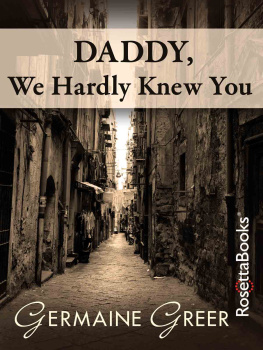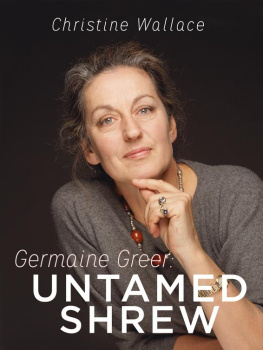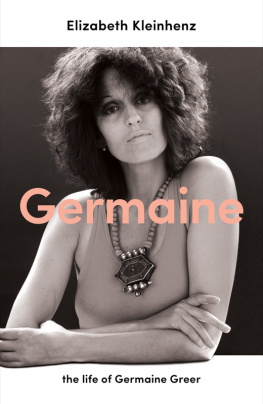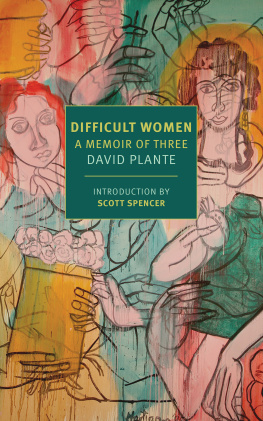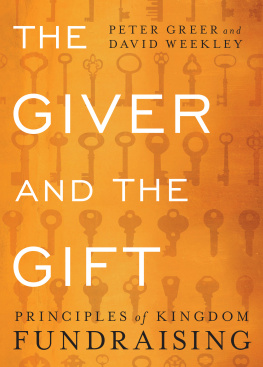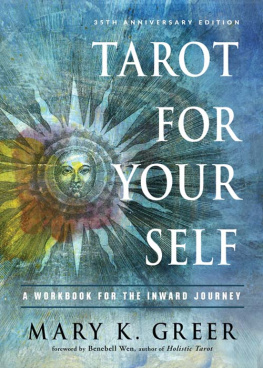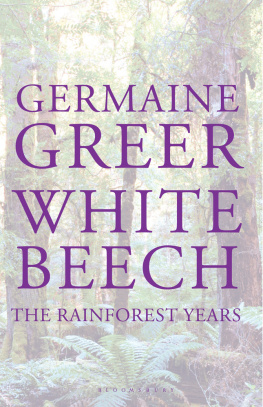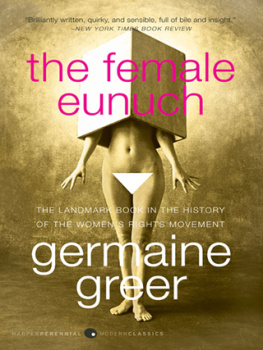Daddy, We Hardly Knew You
Germaine Greer
Copyright
Daddy, We Hardly Knew You
Copyright 1989, 2014 by Germaine Greer
Cover art, special contents, and Electronic Edition 2014 by RosettaBooks LLC
All rights reserved. No part of this book may be used or reproduced in any form or by any electronic or mechanical means, including information storage and retrieval systems, without permission in writing from the publisher, except by a reviewer who may quote brief passages in a review.
Cover jacket design by Alexia Garaventa
ISBN e-Pub edition: 9780795338144
To the memory of
my three grandmothers,
Alida Jensen Lafrank,
Emma Wise Greeney,
Rhoda Elizabeth King.
Authors Acknowledgments
The author wishes to thank all the members of the Greer clan who replied to her letters, all the genealogists amateur and professional who offered their assistance, and all the individuals named in the text who were so kind as to offer to share their impressions of Reg Greer with her and answer questions about the background to Reg Greers career. Not named in the text, but equally deserving of her thanks, are George Randall, Sheila Helpmann, Bob Walker, Bob Piper, Tom Greer, Netta Ward, the Stoward family, Joyce Greer de Holesch, Sir Arthur Lee, Sir Murt and Lady Lee, Lloyd Brown, Helen Doxford Harris, Mary Polis, and Bruce Ruxton. As well, she is anxious to acknowledge the assistance that she received from the Archives Office of the State Library of Tasmania, the Northern Regional Library of Tasmania, the Library of the University of Tasmania, the Tasmanian Permanent Trustees Association, the Latrobe Library and the Newspaper Room of the State Library of Victoria, the Public Record Office of Victoria, the University of Melbourne Archives, the Mitchell Library and the N.S.W. Public Library, the Public Library of South Australia, the State Library of Queensland, the Archives of the State of Queensland, the Australian National Library, the compilers of the Australian Dictionary of National Biography, the National Library of Malta, the India Office Library and Records, the Newspaper Library of the British Library, the National Library of Ireland, the Cambridge University Library, the Office of Population Censuses and Surveys at St Catherines House, London, the Public Record Office at Chancery Lane and Ruskin Avenue, Kew, the Royal Artillery Association at Woolwich, the Artillery Museum at Devlali, the Air Force Office of the Australian Department of Defence, the Victorian Department of Veterans Affairs, the National War Museum Association of Malta, the War Museum, London, the Libraries of the Friends Houses at London and Hobart, the General Register Office in Belfast, and the Probate Offices of Melbourne and Belfast, among others. And, not for the first time, special thanks are due to Leanne Winfield, who kept Mill Farm on an even keel, while the author was leaving no stone unturned.
Contents
The Quest
Your dangers are many. I
Cannot look much but your form suffers
Some strange injury
And seems to die: so vapours
Ravel to clearness on the dawn sea.
SYLVIA PLATH, FULL FATHOM FIVE
I t is silly of me, a middle-aged woman, to call my dead father Daddy. Its not as if I were some giddy heiress anticipating the next instalment of my allowance or Little Orphan Annie learning to get what she wants out of Daddy Warbucks, or yet some southern belle refusing to be her age. My brother and sister called my father Reg, but they knew him better than I did and could permit themselves such familiarity. I always called him Daddy, and much mockery did I take from Mother for doing it. Daddy is a babys palatal word; the word mother on the other hand is admirably adapted for saying through clenched teeth.
When it would have been appropriate for me to have called my father Daddy, I didnt have the chance. Just when he should have been dandling me on his knee while I searched through his pockets for surprises he went away. He wasnt there to see me turn from being a baby into Daddys little girl. It was the war he left me forI knew that much. There was no war in Melbourne. I saw no tanks, no planes, no marching, yet the war was more real to me than many things I had seen. I knew it was there, just out of sight, round a corner, behind the house fronts, ready to burst deafeningly out. I was taken to the movies once but I screamed in such terror at the cartoon that showed aeroplanes with teeth like sharks tearing at each other in the sky that Mother was forced to take me outside. Then I wept so unconsolably that I was never taken to a cinema again. I felt the war had engulfed the whole world, leaving us on a tiny promontory that would soon go under. Daddy was on the other side of the world somewhere trying to hold back the tide. I knew he could never come home on leave, and I wasnt angry or resentful, but I was worried as only children can be. I didnt dare to wish him home. Instead I wished with all my might for the war to end.
This is what I remember. Or rather, this is what I remembered until I found out the truth. Nobody told me any of this, you understand. I was told nothing. I made this all up myself when I was too young to remember that I had made it up. They call it confabulation, when people who are brain-damaged fill the vacancy in their minds with plausible matter, believable but unrelated to the truth. What is written above, dear reader, is such a confabulation. I do not remember the calamity that befell the little girl who made up this stuff; most victims of severe strokes do not remember the precise moment that they were struck down. I could be hypnotised into remembering every snapping strand in my four-year-old heart-break, but there is a limit. I am exhausted now. I can go no further. Some of the keloid must be left in place or my entire personality, gnarled and misshapen as it is, will collapse.
I should have listened when my good friend Jeffrey said, You mustnt face up to facts too much. Make little excuses for yourself, for your father. Not I, I thought stoutly. Now that I see that life is too hard for most people, I regret my thoughtless cruelty. I have been a cow in a china shop, and the result is ruin.
In the last months of his life, when Daddys anxiety threatened to overwhelm him, he would grow quiet if my little niece was set on his knee. He would sit quite still as she chirped and babbled and dribbled on him, as far as anyone could tell, happy. I like to think that he took her for the me he missed out on, his lost baby girl rescued from the maw of time, come to fill up the blank years that yawn between us.
Daddy did come home of course, But, during the years and years that we lived in the same small house, Daddy never once hugged me. If I put my arms around him he would grimace and pretend to shudder and put me from him. It was a joke, of course, a tiresome, hurtful, relentless, stupid joke. I told myself it was a ritual that Daddy needed to bridge some chasm of anxiety. I clung to the faith that he was not genuinely indifferent to me and did not really find me repulsive, although I never quite succeeded in banishing the fear of such a thing. When I was twelve I read Dombey and Son and cried myself blind every night for a week, but I cried for Florence Dombey and not for myself. I knew Daddys strangeness was different, to be expected of a man who was forced to abandon a cuddlesome toddler and allowed to come back only when she had become a sharp-faced skinny little girl who scrutinised him intently with his own longsighted eyes. If he had let me under his guard, I should have crept into his heart and found the wound there.

